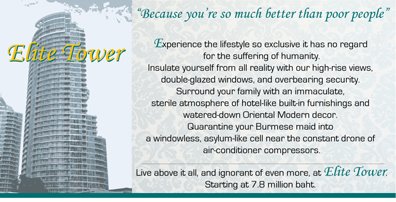BANGKOK – The Bangkok Mass Transit System Public Company Limited (BTSC), operator of the Bangkok Skytrain, proudly announced yesterday that the elevated train system has finally achieved a level of passenger density and discomfort that meets or exceeds Japanese standards.
“As of now, our valued customers can ride the BTS knowing that they are packed in as tightly and miserably as commuters in some of the world’s most advanced cities like Tokyo and Osaka,” said Keeree Kanjanapas, CEO of the BTSC, citing just-released numbers that estimate the average cubic-meter/passenger average of BTS trains to be .19 during peak usage, on par with the .157 average of Tokyo’s most crowded subway lines during weekday rush hours.

“This is a great achievement for Thailand and the Thai people,” he added.
Bangkok’s BTS trains are now ranked #11 in the world in total average passenger density, and a stunning #4 for peak use density, trailing behind only Tokyo, Seoul, and Beijing, and ahead of developed places like Singapore and New York.
“Thais have always admired the capabilities of Japan and Korea,” said Kanjanapas. “Now they can experience the same kind of awkward, forced day-to-day violation of their personal space.”
Since its opening in 1999, the elevated train network has conveniently served the downtown Bangkok area known for severe traffic congestion, yet low passenger numbers prevented the company from achieving a quarterly profit until its 10th anniversary in 2009.
However, worsening traffic conditions plus the link to the MRTA subway in 2004 saw passenger numbers rise, and the recent addition of extensions to the eastern and southern ends of the BTS line has finally filled the trains to beyond capacity, to the BTSC’s delight.
“Our trains are so packed between four to eight p.m. on weekdays that many passengers have to wait for three or four trains to pass before being able to board,” said Surapong Laoha-Unya, BTSC’s COO.
Surapong also noted that the trains were often impossibly full on weekends as well. He credited the impressive progress of the BTS to the crucial co-operation of the Bangkok Metropolitan Authority and the national government, whose “reliable incompetence and political infighting have assured that Bangkok has yet to develop any kind of traffic-management plan.”
“From the powerful elite landowners who won’t allow boulevards to be built through their neighborhoods, to the TRT and offspring parties that withheld funding from the Democrat-led BMA, to the corrupt city police who stifle traffic reform, and of course, to the people of Bangkok for double-parking their cars everywhere, the creation of a street-level nightmare that’s worse than the BTS has been a real team effort,” he added.
The BTSC is optimistically projecting 20% growth in passenger volume this year with no increase in rolling stock or train frequencies. Both have been maxed out under the chaotic conditions created when the company awarded a maintenance contract for the new lines to a Chinese company instead of Siemens, which still maintains the original lines.
To celebrate the important milestone, the BTS will launch a PR campaign this month under the slogan “BTS: Your Ticket To First-World Urban Hell.” The campaign, co-sponsored by Xylitol breath mints and Rexona deodorant, will feature celebrities telling their favorite stories about being crammed uncomfortably against sweaty strangers while being assaulted by loud advertising on cabin TV screens.


